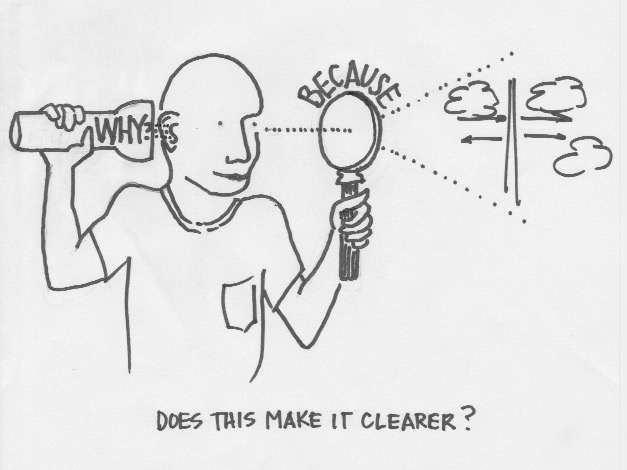
Students ask: Why won’t my supervisors listen to me?
One of the most useful words in the supervisory dialogue (and indeed more broadly) is ‘because’.*
Why does ‘because’ matter? Because it links assertion or proposition or objection to evidence and reasoning. Because it makes the ‘why’ explicit, and hence open to discussion. Because it provides context to what you’re saying, hence making it easier for your supervisors to understand – and respond to – your perspective.
Occasionally, students have sought my advice on the basis that “My supervisors are idiots – what should I do?” Very often, their assessment is based on the lack of ‘because’ in their dialogues. On one hand, they don’t understand why their supervisors make the recommendations they do. On the other, their supervisors don’t accept their arguments, which often fail to provide compelling rationale or evidence. Once the supervisors’ underlying reasoning is exposed, the students often reassess their position, not necessarily changing their opinion of the proposed actions (for example), but respecting the supervisory intentions and understanding how to respond respond in a constructive manner – even if it is to disagree with their supervisors or suggest an alternative.
Think about it: It’s no good saying ‘no’ without a reason; one just looks recalcitrant. And it’s no good saying ‘yes’ without the intention to follow through; one earns a reputation for failing to deliver. Better to ask why, to decline for a reason, or to offer an alternative for a reason.
‘Because’ is the fulcrum for informed debate. It’s not enough to have a position; one must explain, substantiate, and defend it. That’s where the ‘because’ statements fit. As we wrote in The Unwritten Rules (Chapter 4, p.47):
“Be prepared to make claims or suggestions and to back them up. Follow up conjectures or proposals with ‘because’ statements: ‘I think we should check the reliability of the instrument, because our readings are all over the place’; ‘I think we should restructure the framework because the new structure does away with an unused category and clarifies a useful distinction’; ‘I would rather not rely on Bloggs, because his study is deeply flawed in the following ways’; ‘I think we should get someone else involved in the discussion because I need to hear it in different words’. Then be prepared to analyse and critique your ideas and the evidence on which they’re based – and possibly to alter them or to let them go.”
Remember: the goal of research is not to prove yourself to be right, but to find the truth (or a reasonable, informed approximation of it). Sometimes being wrong, or changing perspective, or detecting a flaw in your evidence or reasoning is much more interesting and informative than being ‘right’. Also remember: your discussions with your supervisor(s) are practice for the wider discourse, for presenting and defending your ideas in pubic – when the audience might be much less sympathetic. ‘Because’ is a powerful tool in those discussions, too. Use it.
* And that resonates with one of the fundamental mantras of doctoral research: Research is a discourse (see Chapter 9 of The Unwritten Rules of PhD Research).
This text is licensed under a CC-BY-NC-ND 4.0 license – https://creativecommons.org/licenses/by-nc-nd/4.0/
Images are ©Marian Petre; if you want to re-use any cartoons, please contact me.


